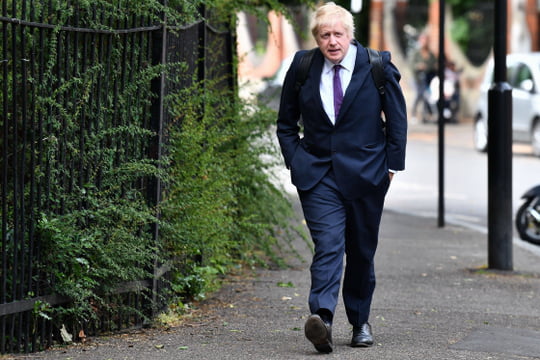Accused of having lied during the campaign for the Brexit, the conservative Boris Johnson is called in british courts. A twist that might upset the succession to the First minister Theresa May.
Summary what is the Brexit ? Definition Referendum on the Brexit : a vote shock what is the hard Brexit ?
Among the eleven candidates declared for the estate of Theresa May, the First british minister, Boris Johnson is among the favorites. But he must now appear before the british courts. The facts alleged against him are about to be manifestly misleading and deceptive that he could hold in 2016, when the campaign for the Brexit. A staunch defender of the output of the United Kingdom of the european Union, it was campaigned around a number, which is plastered on a campaign bus red : the european Union would cost 350 million pounds per week in the United Kingdom (approximately 397 million euros).
It is the use of this figure, widely exaggerated, that accusations against him. On Wednesday, the judge Margot Coleman of Westminster Magistrates Court in London has handed down a judgment considering that the various complaints made against Boris Johnson were admissible. The complainants are led by the activist Marcus Ball, who has gathered 200 000 pounds in an operation of crowdfunding. They use to accuse the chief of “breach of the requirements of a public office”, a crime which dates back to the Thirteenth century. The lawyers of Boris Johnson has denounced a “set-up” for “political purposes”, and an “attempt of some individuals, such as Mr Ball, to get back on the outcome of the referendum”. There is no doubt in any case that this case will be used against that candidate for the succession of Theresa May by its competitors. The process of selection of the next leader of the conservative will be given on June 10, and the result is expected by the end of the month of July.
Theresa May, resigned in full negotiations on the Brexit
The first british minister to leave her office on 7 June. Friday, may 24, clearly moved by Theresa May of regretted it in a short speech delivered in front of 10 Downing Street will not be able to realize the Brexit. The head of the british government clarified that it would not be at the head of the executive on 7 June. She will therefore welcome the us president Donald Trump, who will be heading to the United Kingdom, from 3 to 5 June. It will also be present for the celebration of the anniversary of the allied landings in Normandy on 6 June.
in Addition to his personal case, Theresa May opens a new sequence in the political crisis in the country for months : a person among conservatives seems to want to take his place at the head of the government. The situation is even more chaotic than the question of the implementation of the Brexit remains without a concrete solution. A recent agreement reached between the United Kingdom and the EU on an exit before the 31st of October, the time to negotiate a clean deal, which satisfies all the mp Brussels, was given a suspended sentence. But no scenario is not unanimously in the house of Commons.
clutter on the european elections
The electoral calendar, the european has also caught up with the British : the United Kingdom have been de facto forced to participate in the renewal of the Parliament, since the country still belongs to the Union. The british citizens have, therefore, voted on Thursday 23 may in the european elections of 2019. The advantage of the Brexit, led by Nigel Farage, is at the top with 31.6% of the vote.
As expected, the French have elected 79 members of the european parliament this Sunday, but only 74 of them will actually function in Strasbourg and Brussels. Explanation : the exit of the Uk from the EU will leave vacant places in the european Parliament, which must be redistributed proportionately to the member states. Except that the seats are not yet free, because of britain’s involvement in the european elections. But then why elect-it is, in France, 79 deputies and not 74 in this case ? As mentioned previously, the Brexit should occur by 31 October. By its exit from the EU, the Uk will retain its meps, who will be replaced in part by the five members of the French parliament left in vacation time.
Between their election on the 26th of may and the Brexit, these members “will be in any way (…) of the mps virtual, who have neither a right nor an obligation, but that can take up their function as soon as the Brexit will be effective”, had explained a few weeks ago Sibeth Ndiaye, spokesperson for the government. In the meantime, there is nothing that will force to earn another mandate, but he will not perceive the salary for the position of mep.
learn more what is the Brexit ?
The theoretical definition of Brexit is simple : there is the option of an exit of the Uk from the european Union (“British exit”). This idea is present since decades in a large body of british opinion, eurosceptic or even clearly europhobe. Great Britain, which is not part of the Schengen area and has not adopted the euro, has kept its distances with certain treaties of the EU, since its creation. Margaret Thatcher has long embodied this distrust vis-à-vis european authorities, even using a sentence remained famous in 1979 : “I want my money back” (“I want to get my money back”), to denounce the fact that Britain was paying more than it received from the EU at the time.
More recently, in 2007, David Cameron, then leader of the conservative opposition, promised that a referendum would be held on the Lisbon treaty if the right come to power. The treaty of Lisbon, which replaces the draft european Constitution, had then just been signed by the United Kingdom and its Prime minister, labour’s Gordon Brown. In 2010, David Cameron ultimately won the legislative elections, then it will be re-elected, to general surprise, in the 2015 elections, with the same campaign promise. And it has since been regularly reminded, especially by the most conservative edge of the political party, the “Tories”. The succession of crises in europe on the sovereign debt as well as on the reception of refugees, have pushed the Prime minister to reflect its commitment in this second term.
Referendum on the Brexit : a vote shock
10 November 2015, clearly pushed to his last entrenchments, the british Prime minister first presented in a letter to the requirements of the Great Britain to remain in the EU. Requirements that have been discussed and which have been the subject of an agreement at a european summit on 18 and 19 February 2016. It is this agreement that David Cameron returned to London, defending, therefore, openly maintaining his country in the european Union. But politically, it seemed to acrobatic or even suicidal for him to deny his promise of public consultation. The tenant of 10 Downing Street has announced, effective February 20, 2016, at the exit of the council of ministers, a referendum for the June 23, 2016, while campaigning for the ‘ no ‘ to Brexit. In the Face of a press and to conservatives who are skeptical of the agreement reached, David Cameron has admitted to having “four months to convince”.
June 23, 2016, the referendum on the Brexit finally gave reason to the supporters of the “leave”. Approximately 33.5 million British England, Scotland, Wales and Northern Ireland have voted, and among these, 17.4 million are in favour of the Brexit, or 51.9% of the vote. They were $ 16.1 million to decide to stay in the EU, equivalent to 48.1% of the voters. The vote pro-Brexit is going to cause a jerk in the whole of Europe, starting with London, where David Cameron, in favour of the referendum, but also the maintenance in the european Union, will announce his resignation.
what is the “hard Brexit” ?
The “hard Brexit” scenario is imagined by the supporters of “Brexit”, “hard”, in other words, negotiated with the european Union, but without concessions or almost. It is for these activists, including Theresa May was part of the original, out of the single market, to put an end to the customs union and the free movement of eu citizens in the Uk and not know the jurisdiction of the Court of justice of the EU. The creed of Theresa May and the proponents of “hard Brexit” at the time : “No agreement is better than a bad agreement”. This radical position, which was that of Theresa May at 10 Downing Street in January 2017, and has since progressively evolved and is no longer topical. The Brussels summit April 10, has moved away significantly this perspective, since now, the Uk has obtained a report that allows him a latitude which seems sufficient to agree on an exit of the EU.
Article the most-read – Storm Miguel : the video shock of the drama ” See the news


















